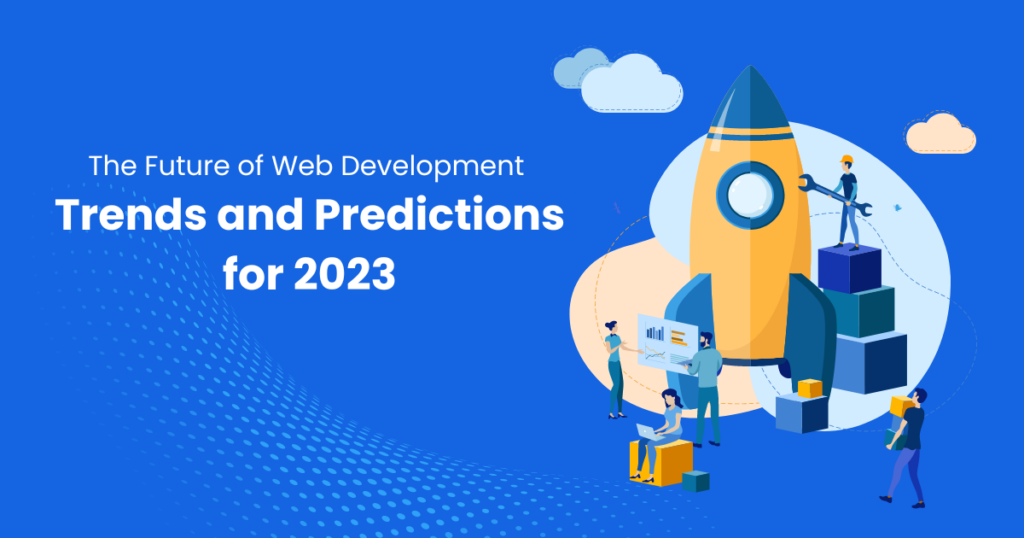
In the rapidly evolving digital landscape, web development plays a pivotal role, in driving the expansion of online experiences and shaping the future of the digital world. As technological advancements continue to surge forward, the significance of website development becomes increasingly apparent. In this blog, experts from UI Collabo will guide you on a journey to explore the transformative trends that are set to define the year 2023.
Harnessing the Potential of AI and Machine Learning in Web Development
Firstly, AI and machine learning have ushered in a new era of possibilities in web development, revolutionizing how websites and applications interact with users. One striking example is the integration of AI-powered chatbots and virtual assistants, which have become instrumental in providing enhanced user interactions. These intelligent bots can simulate human-like conversations, offering instant support, answering queries, and guiding users through websites with personalized assistance. Moreover, machine learning algorithms have empowered web developers to curate personalized user experiences and content recommendations. By analyzing user behavior, preferences, and historical data, websites can dynamically present relevant content, products, or services, tailoring the online journey to each individual. These advancements not only enhance user satisfaction but also optimize conversion rates and overall engagement, making AI and machine learning indispensable tools in shaping the future of web development.
Boosting Accessibility with Progressive Web Apps
Secondly, Progressive Web Apps (PWAs) have gained remarkable traction in the website development landscape due to their numerous benefits and user-centric approach. One key advantage of PWAs is their ability to enable offline access, allowing users to interact with the app even in the absence of a stable internet connection. For instance, a news PWA can store articles for offline reading, ensuring users stay engaged regardless of connectivity. Additionally, PWAs provide a seamless user experience across various devices, whether it’s a desktop computer, smartphone, or tablet. By adopting responsive design principles, PWAs automatically adjust their layout and functionality to suit different screen sizes, creating a consistent and intuitive experience. Given their ability to deliver offline access, responsiveness, and enhanced performance, PWAs are poised to become the future standard for web applications, bridging the gap between traditional websites and native mobile apps, while delivering an unparalleled user experience.
Voice User Interface: Preparing for the Era of Voice Search Optimization
Thirdly, the rise of voice-controlled devices has ushered in a transformative era in web development, with Voice User Interface (VUI) emerging as a game-changer. Voice-activated assistants like Amazon’s Alexa, Google Assistant, and Apple’s Siri have become an integral part of our daily lives, influencing how users interact with websites and applications. To stay competitive in this evolving landscape, voice search optimization has become crucial for websites. Optimizing content and implementing schema markup to accommodate natural language queries can significantly improve search rankings and user engagement. For web developers, integrating VUI in projects requires careful consideration of speech recognition, natural language processing, and context awareness. By harnessing voice technology, developers can craft intuitive interfaces, develop voice-driven apps, and create a more inclusive user experience that caters to the growing number of voice-first users. As voice continues to gain prominence, incorporating VUI into web development strategies is not just a trend but a strategic necessity to remain relevant and accessible in the digital ecosystem.
Fortifying Web Development with Blockchain Integration for Complete Protection
Lastly, blockchain technology holds immense promise in bolstering web security and safeguarding sensitive data. Its decentralized and immutable nature makes it highly resistant to tampering and hacking attempts. For instance, blockchain-based authentication systems can provide more secure user logins by eliminating centralized databases vulnerable to breaches. Additionally, smart contracts on blockchain platforms facilitate secure and transparent transactions, ensuring a trustworthy environment for e-commerce and financial applications. Decentralized applications (dApps) built on blockchain networks further enhance security by removing single points of failure. By distributing data across a network of nodes, dApps reduce the risk of data breaches and improve resilience against cyberattacks. As the web becomes increasingly interconnected, the importance of cybersecurity cannot be overstated. With cyber threats growing in complexity, web developers must prioritize robust security measures to safeguard user information and maintain user trust in the digital realm. Embracing blockchain technology and decentralized principles can be a transformative step towards achieving enhanced security and resilience in the web ecosystem.
Final Thoughts
In conclusion, as we look ahead to 2023 and beyond, AI and Machine Learning, Progressive Web Apps (PWAs), Voice User Interface (VUI), and Blockchain Integration stand out as the top trends reshaping the landscape of website development. Embracing these transformative technologies and other online tools such as UI Collabo will empower us as web developers to create more dynamic, secure, and user-centric online experiences. Our role as developers is to carefully assess each project’s unique requirements and choose the most suitable solutions, ensuring that we meet the demands of an ever-evolving digital world. By staying at the forefront of these trends, we can lead the way in crafting cutting-edge websites and applications that enrich the lives of users and elevate the standards of web development.




